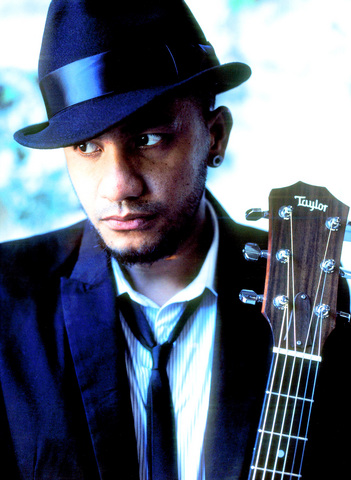The Canadian-born Jacky Zhu (祝釩剛) has been kicked out of 183 Club for being a playboy. In the West a player isn’t such a bad thing, but here it’s more complicated. The pop audience is generally younger and therefore adult material is not welcome. The nation’s youth, it seems, needs to be protected from the predations of people like Zhu.
Zhu’s “sin” was to go nightclubbing and according to informed sources his preferred playground was Room 18, where he would put it about a bit. Regrettably, the poor luvs who were lured to the pop star’s pad were so upset at being just another notch in the star’s bedpost they wrote to Zhu’s record company, Jungiery, and complained.
Jungiery has a stable of wholesome performers like 5566, 7 Flower and K-One. The svengali behind these toothsome grins and pretty haircuts is Sun De-rong (孫德榮, aka Sun Zhong) and he’s famous for managing with an iron hand. If talent steps out of line it’s slapped into shape or pushed out.

PHOTO: TAIPEI TIMES
The country’s moral guardian has been disenchanted with Zhu for some time and had been fining him for his clubbing and sexual infractions. According to a report last month in the Liberty Times (our sister paper), the final straw was a trip to Hong Kong, with a model. The media caught him at the beach applying sunscreen. Pop Stop is tempted to applaud his caring side, but the Times’ outraged tone captures the moment better.
“He was caught intimately applying oil all over her naked body. Even worse, he spent the night at her house. As the result of these intimate pictures, Sun De-rong was provoked,” the Times wrote, adding Zhu’s opinion was that, “This shouldn’t be a problem. ‘Hollywood artists often do these type of things.’”
Now comes the interesting part of the story. Last weekend a Shanghai news report said Sun had finally announced Zhu’s departure and confirmed the band was going to be “five minus one for the foreseeable future.” Fans on the 183 Web site were incredulous.

PHOTO: TAIPEI TIMES
“It is hard to find someone like Jacky. I mean, no one is perfect so I would forgive Jacky for what he did. I honestly don’t think it was something really bad or really serious, but sadly [Sun] thinks it was.... sigh … I am just sooooo sad ... I don’t know if I can ever completely get over this ... SOB ... Jacky please come back,” said a tearful “Trinie.”
The spin on the story was this was a cultural misunderstanding. Foreigners (even Canadian-born Chinese) don’t understand the ways of the East and therefore behavior that is acceptable in Hollywood just doesn’t cut it here. This is true. After all, can you imagine Jolin Tsai (蔡依林) going out on the town without her knickers, her privates flapping in the breeze, like Britney Spears? Obviously not.
However, deep throat sources have revealed another possible reason for Zhu’s departure. They say the recent police dragnet of showbiz people has netted one more victim and that is Zhu, who is said to have been tested for drugs and found wanting. Pop Stop spoke to two representatives at Jungiery and while neither denied the accusation, both repeated the management line that Zhu was asked to leave the group because of bad behavior.
On a positive note, the taike entertainer Chang Chen-yue (張震嶽), who was also swept up in the ongoing police operation, was found not to have taken drugs. Previously he had claimed he was innocent and called on “Earth People” to have faith in him. Earth calling Chang, congratulations. Taike promoter Landy Chang (張培仁) was less fortunate, however, and tests showed he had been taking magic potions.

From the last quarter of 2001, research shows that real housing prices nearly tripled (before a 2012 law to enforce housing price registration, researchers tracked a few large real estate firms to estimate housing price behavior). Incomes have not kept pace, though this has not yet led to defaults. Instead, an increasing chunk of household income goes to mortgage payments. This suggests that even if incomes grow, the mortgage squeeze will still make voters feel like their paychecks won’t stretch to cover expenses. The housing price rises in the last two decades are now driving higher rents. The rental market

July 21 to July 27 If the “Taiwan Independence Association” (TIA) incident had happened four years earlier, it probably wouldn’t have caused much of an uproar. But the arrest of four young suspected independence activists in the early hours of May 9, 1991, sparked outrage, with many denouncing it as a return to the White Terror — a time when anyone could be detained for suspected seditious activity. Not only had martial law been lifted in 1987, just days earlier on May 1, the government had abolished the Temporary Provisions Effective During the Period of National Mobilization for Suppression of the Communist

Hualien lawmaker Fu Kun-chi (傅?萁) is the prime target of the recall campaigns. They want to bring him and everything he represents crashing down. This is an existential test for Fu and a critical symbolic test for the campaigners. It is also a crucial test for both the Chinese Nationalist Party (KMT) and a personal one for party Chairman Eric Chu (朱立倫). Why is Fu such a lightning rod? LOCAL LORD At the dawn of the 2020s, Fu, running as an independent candidate, beat incumbent Democratic Progressive Party (DPP) lawmaker Hsiao Bi-khim (蕭美琴) and a KMT candidate to return to the legislature representing

Fifty-five years ago, a .25-caliber Beretta fired in the revolving door of New York’s Plaza Hotel set Taiwan on an unexpected path to democracy. As Chinese military incursions intensify today, a new documentary, When the Spring Rain Falls (春雨424), revisits that 1970 assassination attempt on then-vice premier Chiang Ching-kuo (蔣經國). Director Sylvia Feng (馮賢賢) raises the question Taiwan faces under existential threat: “How do we safeguard our fragile democracy and precious freedom?” ASSASSINATION After its retreat to Taiwan in 1949, the Chinese Nationalist Party (KMT) regime under Chiang Kai-shek (蔣介石) imposed a ruthless military rule, crushing democratic aspirations and kidnapping dissidents from